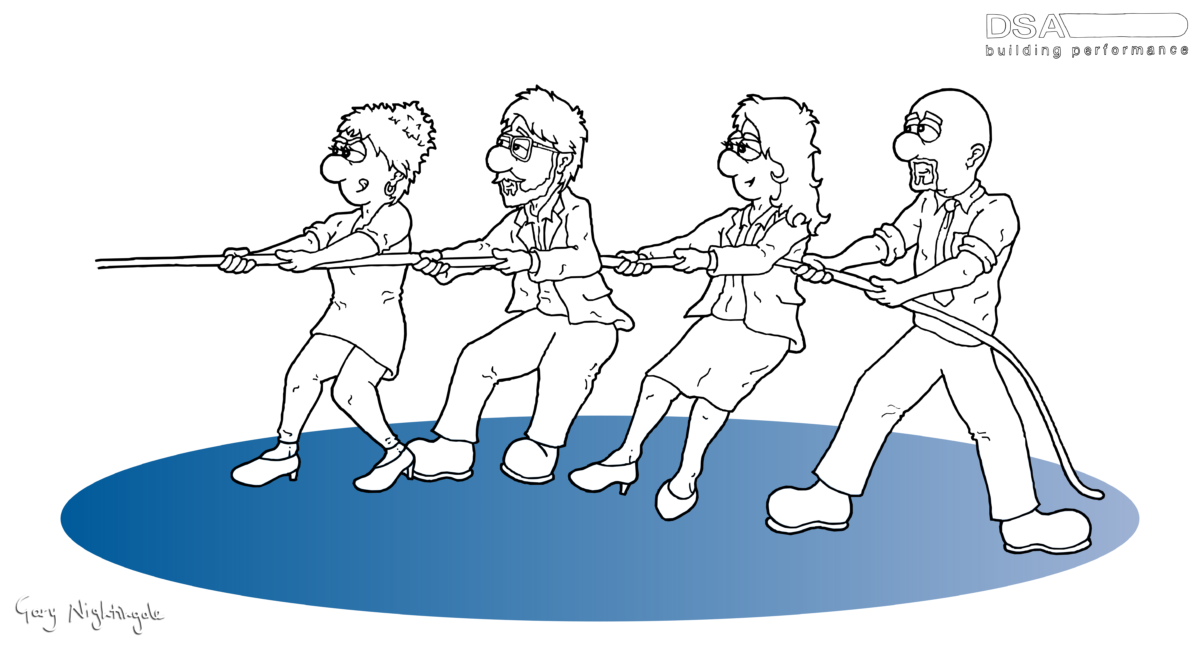Needed: one project hero and an act of God

Most people work in teams. Very little gets done from scratch by one person.
Even this blog post is the product of team work. I have support with editing, illustrating, admin and technology.
As a leadership team coach, I work with senior people from different organisations who’ve come together to lead the delivery of large projects.
And while everybody in the project is working in a team, in very few instances does anyone work on the team.
They haven’t got time, is what you’ll hear.
But the real reason is that we don’t know we can, and must, work on the team. We wrongly assume that if everyone just does their bit, somehow it will all come together.
If we’re lucky, we’ll have someone with a good overview running around trying to coordinate and lubricate the effort – the project hero.
If no such hero steps forward we just hope that the team will gel by itself, as an act of God, like sublime weather on a camping trip.
High-performance teams enjoy ever-improving relationships, communication, performance, productivity, satisfaction and collective learning.
Theoretically this could just happen on its own but, in my 45 years in the industry, I’ve never seen it.
What I have seen is that construction obeys the second law of thermodynamics as faithfully as everything else in the universe. This law states that in a closed system, entropy – disorder – always increases.
A project team is a living system and, as it slides into disorder, it loses its utility no matter how busy everyone is in their silos.
Only an injection of energy can reverse the slide into useless disorder. Working on the team is that injection of energy.
We think chaotic dysfunction is normal because it’s what we’ve experienced for years, but we should see it for what it is: a terrible waste of potential.
Here are three things you can do to work on the team for remarkable, unexpected results
1. Rediscover your team’s purpose
Your team was brought together for a reason, but the reason often gets lost as people succumb to comfort-zone busyness.
For example, a client and their consultants procure a building contractor, and then the client and contractor agree to assemble a joint project team to “lead the collaborative delivery of the project”.
That’s the stated purpose of the team, but is the team really doing everything “on purpose”.
Action: In your next team meeting, ask the question: “Why are we here? What’s our purpose?” And see what people say. You might find it’s a challenging conversation, though you will be working on the team.
If this seems daunting, you might be interested in our Discovery Day, which is designed to help senior teams articulate and agree on their real purpose.
2. Commit to each other’s commitments
Many years ago, a team coach got the team I was in to commit to this. In one of our sessions, she asked each of us what we were really committed to.
After several false starts and lots of patience from her, I blurted out, “Get home once a week in time to bath the kids”. (That meant me leaving the office at 4pm to drive the 94 miles home in time.)
Immediately, each of my four colleagues said “We can commit to that” and thereafter every Tuesday at 4pm they would come into my office and escort me out of the building.
Action: In one of your team sessions find out what each team member is really committed to. Be patient. It might not be a work thing at first. That’s okay once in a while because if people are supported in fulfilling their basic life commitments, they’ll be happier and more productive in work.
Most times it will be related to the team’s purpose, and when the team understands that better, collectively, it will work towards the purpose better together.
Negotiate until you are committed to each other’s commitments.
3. Spend time together, regularly and frequently, doing 1 and 2 above
You can’t be a team if you don’t spend time together, in the same room – physical or virtual.
I once coached a board of directors who’d been together 10 years but the only time they got together was once a quarter to discuss numbers and problem jobs in their respective geographic areas.
As you can imagine, these meetings were frequently acrimonious.
Talking only about that kind of stuff is not working on the team, it’s test-destructing it.
Action: Get a regular monthly session in your team’s diary to do 1 and 2 above. Tell everyone it’s about working on the team.
Devise a tight agenda and stick to it. People might be reluctant at first, thinking it’s just another pointless meeting and a waste of their time.
If you don’t stick to the agenda and allow operational nitty gritty to dominate – rather than purpose, people and commitment – that’s what it will be.
• Quiz: In 1977 I joined an excellent company whose motto was teamwork. Name that company. There’s a clue in Gary’s illustration above.

